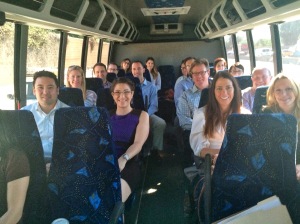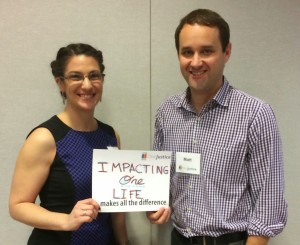These USF School of Law students did . . .
And it unleashed a fountain of creativity and innovation.
Earlier this month, a group of 21 students at the University of San Francisco School of Law did something out-of-the-ordinary during spring break. (And no, it wasn’t a Justice Bus trip this time!). They chose to stay in the classroom for a three-day “boot camp” on nonprofit management. Pretty counter-cultural, right?
The reason was a brand-new class developed by OneJustice in collaboration with USF School of Law, called “Practice Ready Leadership for the Nonprofit Sector.” Designed and taught by Kim Irish, Director of OneJustice’s Healthy Nonprofits program, the class is based on the curriculum of OneJustice’s Executive Fellowship, a 10-month comprehensive program that brings legal aid leaders new business skills.
So over the course of three days, the students learned a wide array of nonprofit management skills, ranging from the history of civil legal aid in California to how to build a project budget with full organizational and overhead costs. They did a deep dive into lateral leadership and strengths-based management of personnel. They conducted scans of the sector and analyzed revenue models. They learned project management skills and debated how to create effective evaluation systems for legal aid projects.
And throughout the class, they worked in small teams to design a new project for a fictional legal aid organization, culminating in a group presentation on the final afternoon on their project goals, sector and financial context, budgets, evaluation metrics, and implementation plans. And the results were simply amazing. In just three quick days, these teams:
- developed the idea for a statewide online intake system, targeted at bringing services to rural communities
- designed a medical-legal partnership focused on holistic services for children with disabilities
- created a pro bono program focused on eviction defense in a small rural county, and
- drafted an outreach and training plan on the new immigration relief programs for advocates around the state.
Aren’t you impressed? We certainly were!
And our big take-away was this: if our sector can offer these bright, strategic, and thoughtful folks opportunities to be part of California’s civil legal aid system post-graduation, either as legal aid attorneys, pro bono volunteers, or Board members, — well, then we’re feeling pretty confident that the sector’s future is in very good hands!
Thank you from all of us at OneJustice to these amazing individuals who chose to spend their spring break with us. You inspired us deeply and taught us more than you can possibly know!



